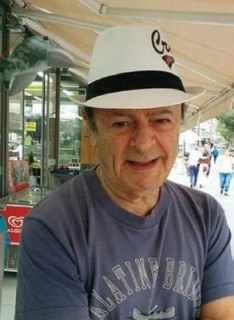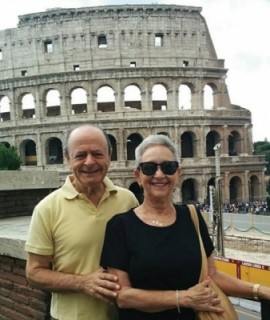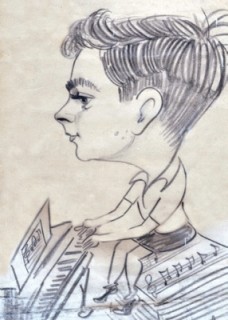Blood, Sweat, and Tours - Book Review
Blood, Sweat, and Tours: Notes from the Diary of a Concert Pianist
By Rami Bar-Niv
AndreA 1070, April 2020; 238 Pages, illustrated
Available on AmazonWhat is a life well lived, and how can you craft one for yourself?
This has been debated for centuries on a philosophical level. For those who prefer a practical example, Rami Bar-Niv's Blood, Sweat, and Tours offers an illuminating guide in the account of his life and career as an internationally acclaimed concert pianist.
The book covers a lot of ground: the mosaic of life in the early days of the State of Israel; the challenge facing any Israeli artist seeking international recognition; the trials and tribulations in the life of a professional musician and his family; the embrace of technological change as a means to further a decidedly non-technological endeavor.
Rami Bar-Niv was born in Tel Aviv in 1945. His mother, Genia, arrived from Poland in 1936 at the age of 18 and his father, Aharon, arrived from Romania in 1939 at the age of 19.
He captures the bustle of a child's daily life in north Tel Aviv, as well as the dynamic, creative atmosphere that seemed ever-present in his home. His musical family may indeed have been his greatest resource. His mother taught him piano and his parents were continually hosting parties for musicians, performers and artists. Readers interested in Tel Aviv life in the early 1950s will warm to these accounts.
Equally important was the sense of adventure and possibility. Rami was surrounded by family and friends who survived the Holocaust and were making new lives in a new country. He was taught and befriended by extraordinarily talented artists who had virtually no chance of success yet succeeded. It became natural for him to get out there and hustle – in the positive sense of the word – and that's exactly what he did.
His book is based on a personal, lifelong diary. We move with Rami from the Academy of Music in Tel Aviv to his studies at Julliard and the Mannes College of Music, thus immersing ourselves in the Israeli-American music scene of the 1960s. We spend summers with him at the Unser Camp – a Labor Zionist affiliated music camp in upstate New York that attracted an array of colorful, Yiddish and Hebrew speaking performers. We network with the cast of characters he meets who are invaluable resources in helping him with concert bookings, recordings and radio shows.
Rami studied at the Academy of Music in Tel Aviv with Karol Klein, Odon Partos and Alexander Uriah Boskovich. He was among the students chosen to perform for Leonard Bernstein when he visited the school – a story which is accompanied by a photograph of Rami bowing to Bernstein.
At Mannes, he studied with Nadia Reisenberg, Carl Schachter and William Kroll. Throughout his career, he performed his favorite popular music – Gershwin and Ragtime – in addition to a repertoire of Baroque, Classical, Romantic and Modern. Among his career highlights was performing his Toccata composition in Cairo in 1982 to mark the signing of the Israel-Egypt peace treaty by Menachem Begin and Anwar Sadat.
We follow Rami through the unfolding technological revolution as it changed the face of music and everything else. He produced his own vinyl album in 1971 and promoted it at his live concerts and radio programs. He went online in 1996, promoting himself on e-lists and mp3.com. He was a YouTube pioneer, as well as an Amazon self-publishing pioneer: His first effort was the 2012 publication of The Art of Piano Fingering; his second is the current book.
Ironically, these advances occurred within the typical challenges of Israeli life: He had to wait until 1976 to have a telephone installed in his apartment, which was five years after he ordered it. Prior to that, his professional communications were conducted with great inefficiency from public phones.
Travel enthusiasts will be captivated by the hundreds of concert tour locations he details, and musicians will, of course, be interested in his repertoire, technique, showmanship and advice.
The general reader will appreciate not only an easily understandable story of music, but also what's required in total to be successful professionally while maintaining a healthy family life. In his words:
"The government and other organizations support the cultural life with millions. Theaters, orchestras, and movies all get financial help; individual artists don't … I organized concert series, I organized a music festival, and did some concert-artists management … I was not only my own manager, I was also my own travel agent, bookkeeper, lawyer, driver, promoter, etc. Later on, I also became my own editor, formatting and design artist, photographer, engraver, manufacturer, and publisher of my music, my books and my recordings."
Rami's personal life and its intimate relationship with his work is an important focus. In addition to his musical parents, he met his wife, Andi, at Unser Camp, which was owned by her father. Rami and Andi have lived in Raanana since 1972. Their life journey is marked with both heartbreaking tragedy – the sudden, fatal illness of a teenaged son, for one – and the determination to be resilient, to persevere and overcome. They have two children and four grandchildren.
Blood, Sweat, and Tours succeeds in presenting a rich tapestry of a particularly Israeli style of life and art. There are passages of concert itineraries that can be somewhat tedious, but other than that minor shortcoming, reading this book is an entertaining and enlightening experience. It can certainly be combined with linking to his music online.
___________________________________________________________
Blood, Sweat, and Tours is available on Amazon Kindle for $22.99; illustrations can be viewed with full color when read on a phone or tablet. Paperback is available for $35 in color and $25 in black and white. All versions are available in Israel.











Comments